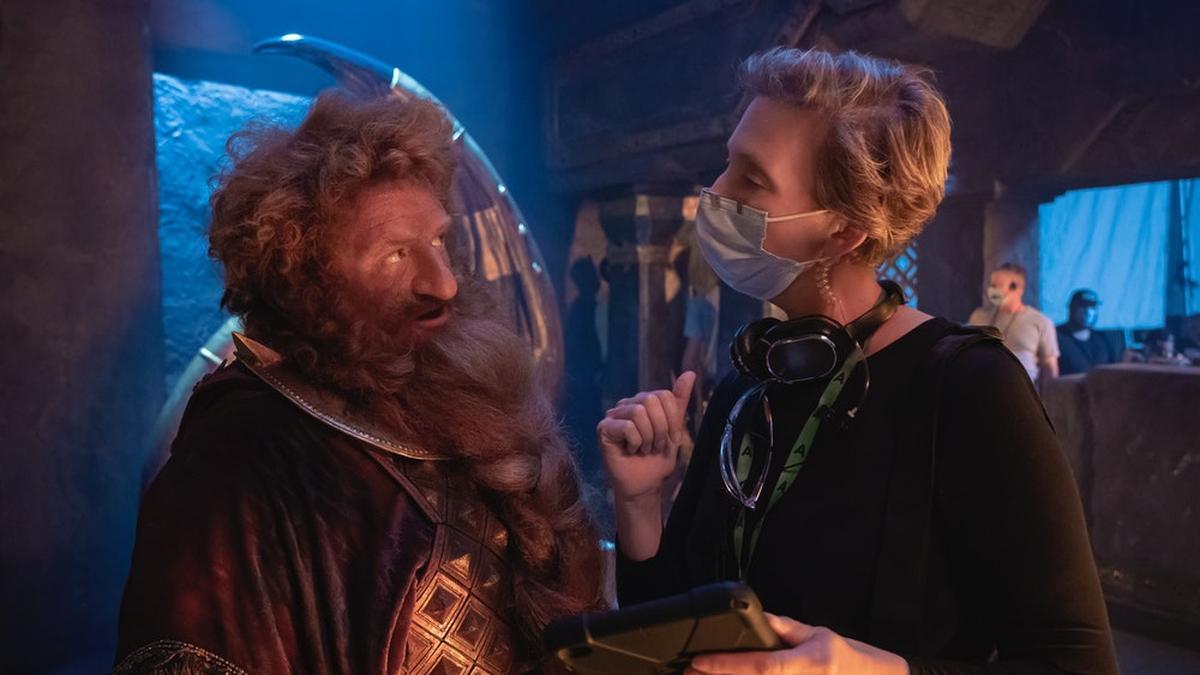
A UK-born, Australia-based expert, Leith McPherson has spent over a decade immersing actors in the rich, fictional tongues of Middle Earth. Her journey began with Peter Jackson’s The Hobbit trilogy, where she first made her mark, and has since positioned herself as the go-to authority for bringing Tolkien’s languages to life on screen.
As we settle into our conversation, it’s immediately clear that Leith is far more than merely the dialect coach on the series; she’s a custodian of Tolkien’s hefty linguistic legacy. Her decade-long tryst with Middle Earth hasn’t just been about making sure actors could pronounce “Mithrandir” without tripping over their tongues; rather, her mission seems much grander — imbuing each character with a linguistic identity that felt as authentic as the prosthetic limbs and pointy ears they don. “It always comes from the intentions that Professor Tolkien originally had,” she explains with reverence. “He wanted to explore a world through language. That’s the part of the show that I get to focus on. And I absolutely love it.”
The sophomore season of The Rings of Power, she tells me, ventures into “untread corners of Middle-earth,” presenting a fresh challenge: to honour Tolkien’s original phonetic legacy while also creating a fresh auditory experience for new, unexplored cultures.
For Leith, the challenge was a welcome one. “This season, we journey to the land of Rhûn,” she says. Rhûn is largely a mystery in Tolkien’s published works, a vast expanse of Middle-earth left intentionally vague by the author. But for the series, Tolkien scholars working with the show have unearthed some of Tolkien’s unpublished notes and used them to build out the beginnings of a language for Rhûn. “Never heard before, never worked with before,” Leith says, her voice practically glowing with enthusiasm. “That was just a gift this season.”
Of course, not all of Middle-Earth’s languages come with such a wealth of source material. Take Black Speech, the guttural tongue of Sauron and his followers, for example. Outside of the infamous ‘Ring verse’, there are only a handful of words available to work with. So how does Leith tackle such a daunting task?
“This was something I established early on that I did not have the credentials to do,” she admits with a chuckle. “Fortunately, we have access to a team of Tolkien scholars who provide all the language work for the show.” Leith’s role, then, is to help actors not just pronounce these words correctly, but to embody them. “My job is to make it feel like it’s a truthful part of them expressing themselves as these characters in this fantastical world.”
One such moment came with Charles Edwards, who plays Celebrimbor, the notorious elven smith responsible for forging the titular Rings of Power. “Charlie had to do a bit in Black Speech — a fairly long bit,” Leith recalls. “We shot for a whole morning, and every single take, I was like, ‘Charlie, give me something to do!’ But he just nailed it, take after take.
.” It’s this kind of dedication that Leith seems to live for, moments where the passion of Tolkien’s work comes to life through the voices of the actors.
When it comes to coaching actors, Leith’s approach is deeply personal. She tailors her methods not just to the language at hand, but to the individual actor and character. “The process is individual,” she explains. “Not only to the cultural groups — like the elves or the orcs — but to the actor as well.” For example, working with an elf like Gil-galad, the High King of the Elves, requires a different approach than working with a character like Adar, an Uruk with a tragic past. “Speaking Black Speech is a physically different thing to do,” she notes. “Even when I’m recording the lines for the actors, I can’t just read it flat. You really kind of get into it.”
The physicality of language is something Leith emphasizes across all her work. Whether it’s the elegant, flowing phrases of Quenya or the brutality of sounds in Black Speech, language is more than just words — it’s a full-body experience. “Language is a physical act,” she says. “When someone tells us that they love us, that has a physical effect on us.”
It’s this attention to the physicality of language that makes Leith’s work so immersive, especially in a world as rich and detailed as Tolkien’s. “For elves, which are timeless creatures, you try to connect to that,” she explains. “You work in a world for these actors where it’s a little bit like Macbeth or an old tale where language has an actual effect — magic has an actual effect on the world around you.”
Steering away from Middle Earth, Leith’s work beyond Tolkien’s universe includes working on the stage production of Harry Potter and the Cursed Child, which she admits has a slightly different process. “It always starts with truth and connection. Whether I’m dealing with contemporary speech or a language Tolkien invented, it’s about grounding the actor in their character’s reality. If I’m not tapping into that authenticity, then I’m just layering something artificial onto their performance,” she says.
Before we wrapped, I couldn’t help but ask about her recent jaunts to Taylor Swift’s The Eras Tour at Wembley (she’s been twice, naturally). With Swift’s formidable vocal range, I asked whether she’d be a natural at Quenya. Leith chuckles, “Oh, I think Taylor could handle anything! Look at Reputation — she’d be fine with the Black Speech as well! Is there anything Taylor cannot do? I think that’s where I would leave that.”
The Rings of Power Season 2 premieres on Amazon Prime Video on August 29.












